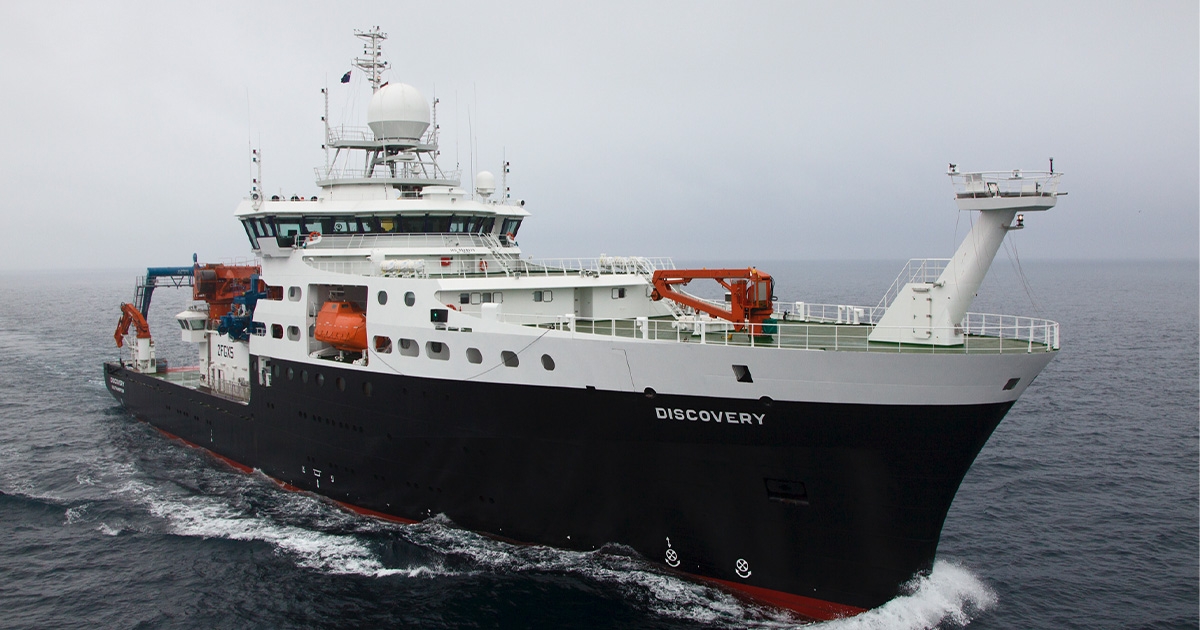UK Government Awards £45 Million to Maintain State-of-the-Art Fleet of Research Vessels

£45 million in funding to maintain the UK’s state-of-the-art fleet of research vessels was recently announced by Industry and Maritime Minister Nusrat Ghani.
The £45 million contract, awarded to Babcock International by the Natural Environment Research Council (NERC), is a key component of the government’s National Shipbuilding Strategy, boosting investment in the prestigious UK shipbuilding industry.
Maintenance and upgrades will be carried out on RRS Sir David Attenborough, RRS Discovery, and RRS James Cook. These 3 ships conduct innovative scientific research into our oceans and polar regions, and support scientists tackling global issues such as climate change and pollution.
Industry and Maritime Minister Nusrat Ghani said, “RRS Sir David Attenborough and its maiden voyage to Antarctica inspired the explorer in all of us, venturing into some of the world’s most unforgiving climates, while conducting vital scientific research on pressing global issues like sea level rise and marine biodiversity. This research is invaluable, which is why we are committing the funding needed for the upkeep of these key research vessels, drawing on Rosyth Shipyard’s proven track record of excellent work maintaining UK ships.”
The shipbuilding industry supports more than 40,000 jobs across the UK. This investment will secure highly skilled jobs and suppliers to maintain the UK’s advanced fleet of research ships. The initial 3-year contract, with additional 2-year option, will see the large oceanographic and polar research vessels dock at Babcock’s state-of-the-art facilities in Rosyth, Scotland, for scheduled maintenance and upgrade work.
The RRS Sir David Attenborough is operated by the British Antarctic Survey (BAS) and is one of the world’s most advanced polar research vessels, having departed the UK for its maiden voyage in November 2021. The vessel recently left its UK home port on 20 November 2022, for a 6-month expedition to Antarctica. In the coming expedition, the RRS Sir David Attenborough will be testing a new artificial intelligence system which will help chart the most environmentally-friendly route at any given time. Measuring 129 meters in length and with a range of 19,000 nautical miles, it accommodates up to 90 crew, scientists, and support staff, and will enable research of the oceans, seafloor, ice and atmosphere.
The RRS Discovery (2013) and RRS James Cook (2006) are operated by the National Oceanography Centre (NOC). They conduct oceanic exploration around the world, undertaking multi-disciplinary marine science to unlock the mysteries of the deep ocean. Following the refit, RRS Discovery will be heading to the Arctic to explore nitrogen fixation with the University of Liverpool and NERC. The RRS James Cook will continue its research expeditions to some of Earth’s most challenging environments, from tropical oceans to the edge of ice sheets.
All 3 research ships use state-of-the-art technologies such as autonomous underwater vehicles, including the famous NOC Autosub called Boaty McBoatface. Boaty, and other NOC-developed technologies have the ability to travel under ice and to depths of 6,000 meters to investigate the process driving change in the Polar regions. The marine robot fleet at NOC is one of the most capable in the world and support the ships’ scientific research with environmentally-friendly marine observation.
Learn more about NOC’s National Marine Facilities.

